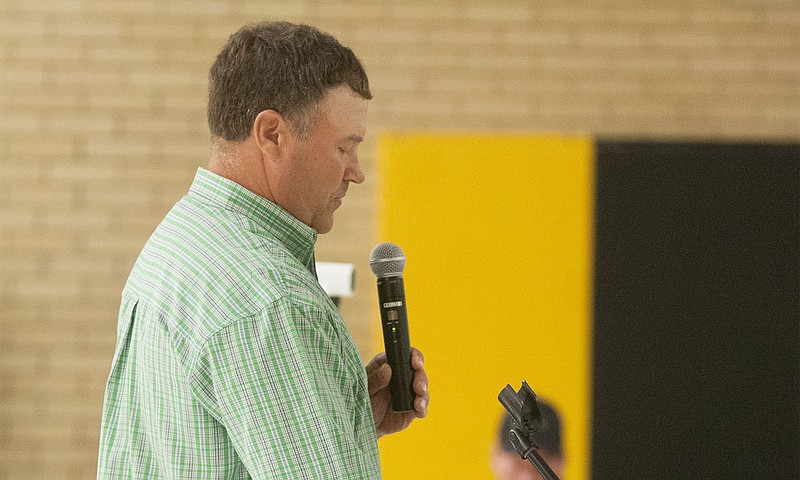While some mysteries were dispelled about a potential Kingdom City-area hog confinement during a forum Tuesday night, residents are still trying to foresee how the operation will work based on responses to the group's 36 questions, said Jeff Jones, a spokesman for the nearly 35 residents.
Those living within a 3,000-foot radius of the potential site were mailed a letter in May informing them Eichelberger Farms, an Iowa-based company, wanted to build a confinement that could house up to 7,600 sows and 2,720 swine on Horstmeier Farms located of off State Route HH. Gary and Darren Horstmeier, father and son, run the farm.
The citizen group posed the 36 questions, wanting specific information on facilities, infrastructure, waste management, disease control, deceased animal disposition and economics, which were answered by Dr. Steve Menke, a veterinarian with Pipestone Veterinary Services who works with Eichelberger Farms.
Menke's responses were read Tuesday night by Tim Safranski, a swine specialist with the University of Missouri, whose students go on to work for Pipestone post graduation. Many in attendance asked for the responses to be published, but Safranski said he was not authorized to do so at that time. Direct requests to Menke prompted them to be available to the public on Thursday.
Now, Jones said he and others are taking the time to "process these answers" in order to come to a consensus.
Without the Eichelberger's application to the DNR - which has yet to be filed - Jones said the conception of the confinement is still hazy.
"We're kind of guessing what it could be, what it might be and what it's going to be," Jones said.
Jones felt optimistic about the fact that the process is still in the early stages, giving more time for residents to give their thoughts on "what could be." But in the end, Jones said he wishes for the Eichelbergers to go elsewhere.
"I hope in my heart that they will take this to a less populated area," Jones said, adding he still wants to know why the Eichelbergers sought out this particular location.
Their options may be none or very limited due to a lack of county regulations. Callaway County Presiding Commissioner Gary Jungermann said the county has no planning or zoning regulations to stop the hog confinement from coming in.
While "Why Kingdom City?" remains unanswered for Jones, Safranski said Missouri has historically been used as a breeding ground by Iowa companies.
The Iowa hog industry is so saturated, Safranski said, a person can "stand on the top of one barn and see the next." The close proximity causes diseases among the pigs to spread more quickly, so to prevent that, pigs are birthed and raised in the Show-Me State.
Today, according to Safranski, Missouri transports about 4 million pigs annually to Iowa for finishing, ranking Missouri fifth in pig production, but first in pig inventory.
Pork production in Missouri results in $791 million in gross state product and $96.4 million in export income as well as 12,663 jobs and 2,533 export jobs, according to the National Pork Producers Council.
That's a similar model to what Eichelberger plans to pursue in Kingdom City.
The Proposed Plan
Three buildings will house hogs on 20 acres of Horstmeier's farms for gestation (fetus development inside sows: impregnated female pigs), farrowing (birthing) and gilt developing (growth of a female pig until becoming a sow).
A group of sows could be divided and finished at a location of the Eichelberger's choosing, which Menke said will likely be in Iowa, as well as Horstmeier Farms where there are four hog barns.
Hog carcasses will be composted, Menke wrote in his response. Horstmeier Farms currently incinerate the dead animals.
"Missouri-engineered compost facility will be part of the permit process," Menke wrote. "Locally produced compost material will be utilized."
Menke said once the hogs complete the finishing process, they are harvested at Triumph Foods, a company based in St. Joseph, that is a top exporter of pork products globally, according to its website. Eichelberger Farms is a part owner of Triumph Foods, which processes 5.5 million hogs annually, according to its website.
Local Protest
Concerned residents have expressed a dislike of a "corporation" coming to the area, name dropping four major meat producers: Smithfield, Cargill, Tyson and JBS USA.
Eichelberger Farms is family operated primarily by a father-and-son team like the Horstmeiers.
"When you're not in those top four, you're fighting for the little guy and we're that little guy. I feel good about what we're trying to do," Darren Horstmeier said, adding that he is still pursuing a partnership with Eichelberger Farms.
Triumph Foods may not be in that top four, but it was the second largest U.S. sow producer in 2013 with 381,500, according a report from Succesful Farming Magazine - a resource Safranski recommended to the Fulton Sun. Smithfield claimed the top spot with 868,000 sows. Eichelberger, though, contributed the smallest number of sows to Triumph with 30,000.
Christensen Farms of Minnesota added 156,500 sows to Triumph Foods; HANOR, 82,500; Allied Producers' Cooperative, 60,500; and New Fashion Pork, 52,000.
Policy is designed to benefit the bigger guys, said Melinda Hemmelgarn, a registered dietitian who focuses on how food production affects human health.
A lack of local or regional resources for farmers have limited the market, she added, allowing corporations to have a "grab of the food system."
Health Concerns
"What we need for sure is farmers to have regional markets ... bring in animals and sell directly to customers," Hemmelgarn said.
She added that farmers markets play an important role in offering a connection between farmer and consumer, allowing one-on-one conversations about what people are putting into their bodies.
It's also an opportunity to talk about the use of antibiotics - an issue she raised at Tuesday's meeting.
According to Menke, "federally licensed antibiotics approved for swine use" will only be necessary on an as needed basis.
"Any antibiotics used is on an individual basis to provide for the welfare of the animals," Menke told the Fulton Sun.
He also said antibiotics and growth promotion won't be found in the hogs' food.
"We use no antibiotics in the feed. Period," Menke said.
Hemmelgarn was skeptical though with the close proximity of hogs in each facility. The gestation building will hold 6,300 sows; farrowing, 1,200; and gilt developer, 1,100.
Bacteria grows a resistance to antibiotics and animals treated with antibiotics transfer antibiotic-resistant bacteria to humans through meat or crops that have been treated with water or fertilizer containing their feces. According to the CDC, more than 2 million U.S. citizens receive infections resistant to antibiotics and 23,000 of those die.
"We as a society are facing a crisis with antibiotics," Hemmelgarn said.
Moving forward, Hemmelgarn said those with worries about what could happen on Horstmeier Farms shouldn't fight, rather assess how local farmers can support a local economy and ask the question: "What can we do to support Mr. Horstmeier?"
"This is our community," Hemmelgarn said. "When we're divided we're going to fall."


